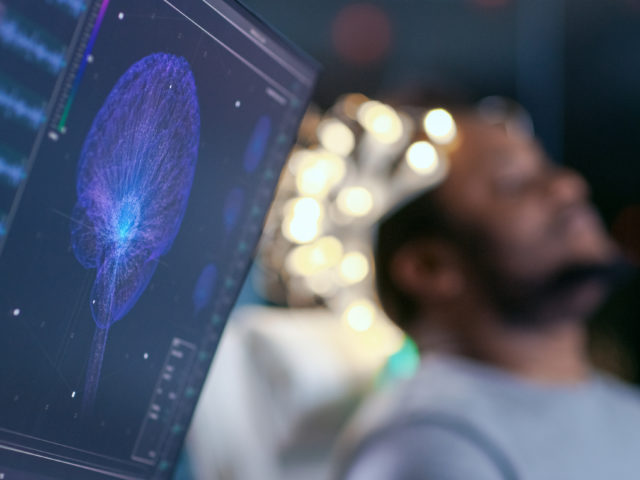Has your doctor recommended that you undergo a sleep study? If so, you may be one of the millions of Americans who suffer from a sleep disorder. The good news is that treatment is available to improve the quality of sleep you get, which will ultimately improve your quality of life, as well as your health. People who have sleep disorders tend to be tired and irritable during the day. In fact, the fatigue of inadequate sleep is a leading cause of motor vehicle accidents in this country. Other health issues associated with sleep disorders include chronic headaches, hypertension, heart disease, depression, and stroke. Having a sleep study will help your doctor identify why you are sleep deprived. So what exactly can you expect to learn when you review the results of your sleep study with your doctor?
What are We Looking For?
The most common reason that a sleep study is ordered is when obstructive sleep apnea (OSA) is suspected. When someone has this disorder, they suffer from a blocked airway during sleep, which causes snoring, choking or complete interruption of breathing (apnea). These frequent interruptions interfere with sleep, as well as deprive the body of needed oxygen. If OSA is already a known problem, a sleep study can be conducted to adjust CPAP (continuous positive airway pressure) therapy, which is a special mechanism that is worn at night to keep your airway open and eliminate periods of apnea. Sleep studies can also be used to diagnose other sleep-disordered breathing syndromes, restless leg syndrome, sleep disorders that involve abnormal movements, behaviors, emotions, perceptions, and dreams (parasomnias), nighttime seizures, and excessive daytime sleepiness (narcolepsy).
Before you go to sleep, you will be attached to a number of devices, including electrode patches on your head, chest, and legs. You may have belts around your waste and you will have a small tube under your nose. While these apparatuses may seem strange, they will not cause any discomfort. There will probably also be a microphone in the room, as well as other equipment that will be used to monitor brain activity, movement, heart rhythm, breathing, and other activates such as snoring.
What is Measured During the Study?
There are a number of different variables that are measured during the sleep study; each has a purpose to determine your diagnosis.
Sleep Stages
By looking at your brain activity with an electroencephalogram (EEG), your muscle activity with an electromyogram (EMG), and your eye movement with an electrooculogram (EOG), the timing and duration of your sleep stages can be determined. These devices can also pick up other activities. For example, flaccid muscles usually indicate the rapid eye movement (REM) stage of sleep. The EMG may also pick up jaw clenching or tooth grinding, and the EEG will detect any seizure activity.
Respiratory Effort, Airflow, and Snoring
Various types of technology are utilized to evaluate the quality of breathing during sleep. For instance, an EMG may be used to monitor the strength and depth of your breathing. On the other hand, tubing attached near your nose (nasal prongs) can measure the force of the air you are breathing in and out, and a thermistor is a device to detect changes in air temperature from your mouth, identifying the amount of air being moved through your mouth. Finally, snoring will be picked up and recorded through the microphone in the room.
Oxygen and Carbon Dioxide
When you breathe in, you take in oxygen, which is carried by your blood to the rest of your body. When you exhale, you expel the carbon dioxide that is the byproduct of your bodily functions. Special monitors that detect oxygen and carbon dioxide levels can reveal if you are not breathing effectively enough to sustain a healthy environment within your body.
Heart Function
Irregular heart rhythms during sleep can be identified using electrocardiograms (ECG).
Body Position, Movement, and Brain Activity
Sometimes the position your body is in will interfere with sleep or with breathing. Additionally, certain limb movements are associated with sleep disorders. Video monitors, along with other monitoring devices, are used to detect movement and position. EEG readings can be correlated to events such as limb movements or breathing patterns.
What Can You Learn During the Review?
A sleep study reveals a great deal of information about your breathing patterns and sleep performance. It is important that a trained sleep specialist interprets your results so that you receive an accurate diagnosis and appropriate treatment. Amidst the information gathered, your specialist will be able to evaluate a number of variables including your total sleep time and wakeful periods as compared to the total time during the study, how long it takes you to go to sleep, how long you spend in each stage of sleep, if and how often you reduce or stop your breathing, and how often you wake up – including arousals due to your breathing. They can also determine if your position is related to any problems, such as snoring or periods of apnea, and if you have any limb movements.
By cross-referencing the information that is displayed in real time, your doctor will be able to see what is occurring at the same time. This will allow them to form conclusions about relationships. For example, lying on your back may be associated with snoring, low oxygen levels, and irregular heart rhythms. After your review, you should have a better understanding of the problems you are having with sleep and possible solutions that will lead to more restful sleep periods, improved quality of life, and better health.
If you are concerned that you have a sleep disorder, you deserve advice from an expert in sleep medicine. Dr. Gringas is a highly qualified, board-certified sleep medicine specialist. For any questions regarding sleep studies, or sleep-related problems, please call the helpful staff at Gingras Sleep Medicine in Charlotte and Concord, North Carolina at (704) 944-0562, or request an appointment online.

